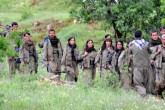Discussions about a possible military intervention have flared up after the chemical attack organized by the Syrian regime on August 21 in Gutha, Damascus. The US has naturally taken the center stage since President Obama had emphasized the “red line” quite often before these discussions. The Senate group backing up the military intervention is strong but the game is a tie in the US Congress. Even if the resolution for US strike is approved, the scope and duration of the intervention are still being discussed as the bargaining continues beyond borders.
In fact, there are members of the US administration and the Republicans who have supported a possible military operation in Syria for quite some time, among whom are the US National Security Adviser Susan Rice and the US Ambassador to the United Nations (UN) Samantha Power. However, the influence of this duo on President Barack Obama has weakened following the attack against the US Embassy in Libya.
One of the most active American actors for Syria is Senator John McCain. The Senator has not only endorsed military support for the Syrian opponents but also paid a visit to the war zone in northern Syria and met with many opposition groups, including al Nusra – though it is not known much.
OBAMA’S PRESTIGE
Although Obama says “Not mine but the world’s prestige is put on a test,” it is in fact, the level of determination that the US can show against Russia and Iran that is being tested. Besides, the US believes that it is necessary to intervene because of the use of chemical weapons, which also poses a threat to the US presence in the region.
It is critical to use arguments about the “security of Israel” in order to have the public support and the support of the Congress, in particular. This is because Syria is no longer a predictable country for Israel. Israel tacitly supported al Assad as long as he was capable of controlling Syria. An Assad who cannot keep Syria under control is useless for Israel. For this reason, Syria needs to be controllable as soon as possible.
Although the US seems to believe that an intervention is necessary, they have great deal of concerns. As we look into the hearings on Syria held in the Senate and the Congress Foreign Relations Committees last Wednesday, it is seen that a considerable number of people have concerns about the intervention.
THE ISLAMIC FRONT PHOBIA
The primary concern is that the actors who will be supported in the intervention are not reliable for the US. It is understood from Secretary of State John Kerry’s answer to a relevant question in the hearing that the US has built a close relation with the Commander of the Free Syrian Army, Salim Idris, and Kerry believes that Idris can repel possible threats of the Islamic fronts. If we lay aside the question of who will be the real threat, it is being naive to foresee that the Military Council under Idris will be able to build up a military monopoly in Syria.
It is possible to say that the US sees the Islamic fronts as the biggest danger. By Islamic fronts, I do not only mean al Qaeda in Iraq and al Nusra, but also Ahrar al Sham, Liva’ul Tawhid or Liva’ul Islam all of which set a threat according to the US. And the US regards every such organization as the al Qaeda. In this particular subject, if the US does not draw a line between the Iraqi al Qaeda with its dark connections and the other groups, then there is not much to do because a significant part of the fight in the field is executed by these fronts.
A combination of obligations and concerns will determine the scope of the possible intervention in Syria. The best course of action for the US is to warn Bashar al Assad and the opponent groups it supports, and make them sit at the table considering the security of Israel and the “danger” of Islamic fronts, and find an interim formula. Of course, in the meantime, the biggest obstacle for the US will be the fact that they can
In this article
- Foreign Policy
- Opinion
- Al Qaeda
- Assad Regime
- Bashar Al Assad
- chemical
- esed
- Free Syrian Army
- Free Syrian Army (FSA)
- Global Actors | Local Actors
- Intervention in Syria
- Iraq
- Islam
- Islamic
- Islamic Republic of Iran
- Israel
- Libya
- Libyan Crisis
- Middle East
- NATO
- Opposition
- Red Line
- Russia
- Syria
- Syrian Civil War
- Syrian Conflict
- Syrian Crisis
- Syrian Regime
- United Nations (UN)
- United States (US)
- USA



